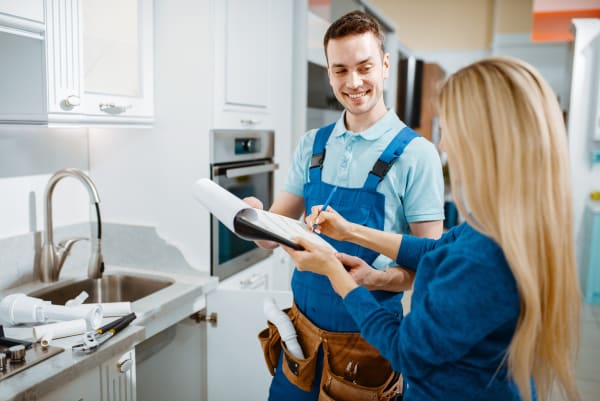Indeed, it’s hard to deny: the allure of a quick do-it-yourself (DIY) fix is strong, especially when faced with a leaky faucet or a clogged drain. But when it comes to plumbing, venturing into uncharted territory can be more perilous than you think.
Before you grab your wrench and dive headfirst into a plumbing project, consider the hidden dangers lurking beneath the surface with regard to taking on the DIY route. Continue reading below to learn more.

Unmasking The Hidden Perils Of DIY Plumbing
Sure, a leaky faucet might seem like a mere annoyance. But what if that seemingly harmless drip becomes a hidden waterfall behind your walls, nurturing a thriving colony of mold and attracting unwanted guests like unwanted relatives? Or, consider your valiant attempt to unclog a drain, only to nick a hidden pipe, unleashing a geyser of unpleasantness that would make a horror movie proud.
The above-mentioned are just the tip of the iceberg when it comes to the unseen dangers of DIY plumbing. Improperly fixed pipes can lead to chronic leaks, not only damaging your property but also creating breeding grounds for harmful bacteria and even attracting unwanted pests. Messing with gas lines, on the other hand, is extremely dangerous: explosions and carbon monoxide poisoning are a real possibility in improper plumbing fixes.
Knowledge Is Power (And Saves You Money): Why Working With A Professional Plumber Is Worth It
Even if you possess the tools and a can-do spirit, tackling complex plumbing issues without proper knowledge is like navigating a minefield blindfolded. Plumbing systems are intricate networks, where a seemingly simple fix in one area can trigger unintended consequences elsewhere. Understanding local codes and regulations is equally crucial, as non-compliant work can result in hefty fines and can even revoke your homeowner’s insurance.
While the initial cost of hiring a local plumber might seem daunting, consider the hidden costs of DIY mishaps. The potential for property damage, personal injury, voiding warranties, and the emotional toll of dealing with unforeseen complications can quickly outweigh any initial savings.
Investing in peace of mind and professional expertise is always the wiser choice. A qualified plumber can not only fix your current plumbing woes but also prevent future problems, saving you money and hassle in the long run.
When To Ditch The DIY Route And Call The Plumbing Professionals
So, when does your DIY spirit become foolhardy? Here are some telltale signs to watch out for:
-
Extensive leaks, drains that defy all your efforts, or issues with gas lines are best left to trained professionals who possess the experience and equipment to handle them safely.
-
If the job requires tools you wouldn’t find in your average toolbox or lack experience using, hiring a professional is both safer and more cost-effective.
-
Diagnosing the root of a plumbing problem can be tricky. A plumber has the expertise to pinpoint the culprit and recommend the most effective solution.
-
Any job involving gas lines, electrical components, or potential exposure to harmful substances should be handled by a licensed professional who knows the precautions and procedures.
Helpful Plumbing Tips You Should Know
Now that you’re armed with the knowledge of when to call in professional help when it comes with at-home plumbing concerns, here are some additional tips to navigate the murky waters of plumbing:
-
Befriend The Homeowner’s Manual: Familiarize yourself with your home’s plumbing system by consulting the owner’s manual. It can provide valuable insights into specific components and potential trouble spots.
-
Keep In Mind The Power Of Prevention: Regular maintenance goes a long way in preventing major plumbing issues. Invest in a drain snake for minor clogs, clean faucet aerators regularly, and address dripping faucets promptly.
-
Do DIY For Small Fry Plumbing Issues: Simple tasks like replacing a showerhead or fixing a leaky toilet flapper might be manageable for DIY enthusiasts with some research and the right tools. Remember, start small and know your plumbing capabilities and limits.
-
Befriend Your Local Plumber: Build a relationship with a reputable plumber in your area before an emergency strikes. This way, you'll have a trusted professional to call upon when needed.
How To Forge A Strong Relationship With Your Trusty Professional Home Plumber
Think of your plumber as a trusted advisor for your home’s plumbing system. Here’s how to cultivate a mutually beneficial relationship between the two of you for the betterment of your living space’s plumbing:
-
Schedule Regular Checkups: Just like your auto, your plumbing system benefits from regular checkups. Schedule annual inspections with your plumber to identify potential problems early on, preventing minor issues from turning into major headaches.
-
Don’t Wait Until Disaster Strikes: Don’t hesitate to contact your plumber for any concerns, not just emergencies. Early intervention can save you money and prevent bigger problems down the line.
-
Open Communication Is Key: Clearly communicate your concerns and observations to your plumber. The more information they have, the better they can diagnose and address the issue.
To Conclude
Remember, calling a plumber isn’t a sign of weakness; it’s a sign of wisdom. A qualified plumber has the knowledge, experience, and tools to tackle even the most complex plumbing challenges efficiently and safely. They can diagnose the problem accurately, recommend the most appropriate solution, and ensure the work meets all code requirements, saving you the stress of deciphering cryptic regulations.






